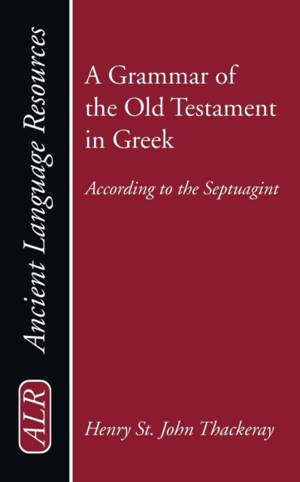
- Afhalen na 1 uur in een winkel met voorraad
- Gratis thuislevering in België vanaf € 30
- Ruim aanbod met 7 miljoen producten
- Afhalen na 1 uur in een winkel met voorraad
- Gratis thuislevering in België vanaf € 30
- Ruim aanbod met 7 miljoen producten
Zoeken
Omschrijving
Thackeray's treatment of the Septuagint's grammar is a masterful reference work, which moved Septuagintal study forward. ""Why write a Grammar of a translation, in parts a servile translation, into a Greek which is far removed from the Attic standard, of an original which was often imperfectly understood? A sufficient answer might be that the work forms part of a larger whole, the Grammar of Hellenistic Greek, the claims of which, as bridging the gulf between the ancient and the modern tongue upon the attention of philhellenes and philologists have in recent years begun to receive their due recognition from a growing company of scholars. The Septuagint, in view both of the period which it covers and the variety of its styles, ranging from the non-literary vernacular to the artificial Atticistic, affords the most promising ground for the investigation of the peculiarities of the Hellenistic or 'common' language . . . Though of less paramount importance than the New Testament, the fact that it was the only form in which the older Scriptures were known to many generations of Jews and Christians and the deep influence which it exercised upon New Testament and Patristic writers justify a separate treatment of its language. Again, the fact that it is in the main translation gives it a special character and raises the difficult question of the extent of Semitic influence upon the written and spoken Greek of a bilingual people."" -from the Preface Contents I. Introduction II. Orthography and Phonetics III. Accidence
Specificaties
Betrokkenen
- Auteur(s):
- Uitgeverij:
Inhoud
- Aantal bladzijden:
- 366
- Taal:
- Engels
- Reeks:
Eigenschappen
- Productcode (EAN):
- 9781606081662
- Verschijningsdatum:
- 1/09/2008
- Uitvoering:
- Paperback
- Formaat:
- Trade paperback (VS)
- Afmetingen:
- 127 mm x 201 mm
- Gewicht:
- 340 g

Alleen bij Standaard Boekhandel
+ 97 punten op je klantenkaart van Standaard Boekhandel
Beoordelingen
We publiceren alleen reviews die voldoen aan de voorwaarden voor reviews. Bekijk onze voorwaarden voor reviews.







